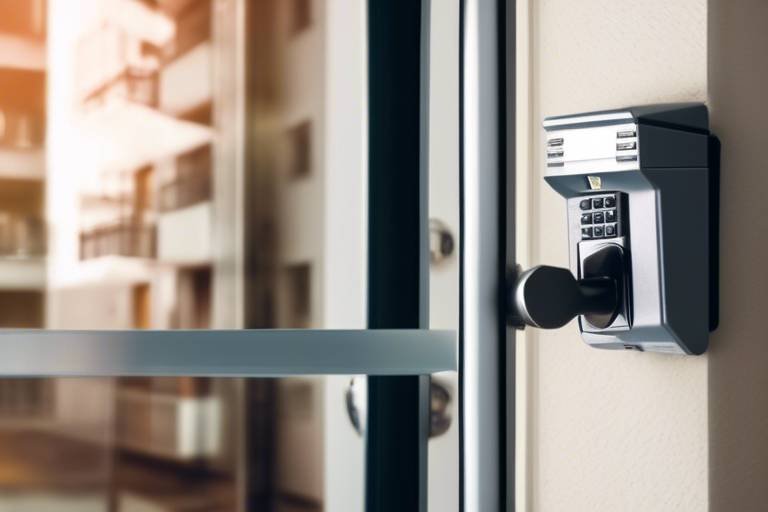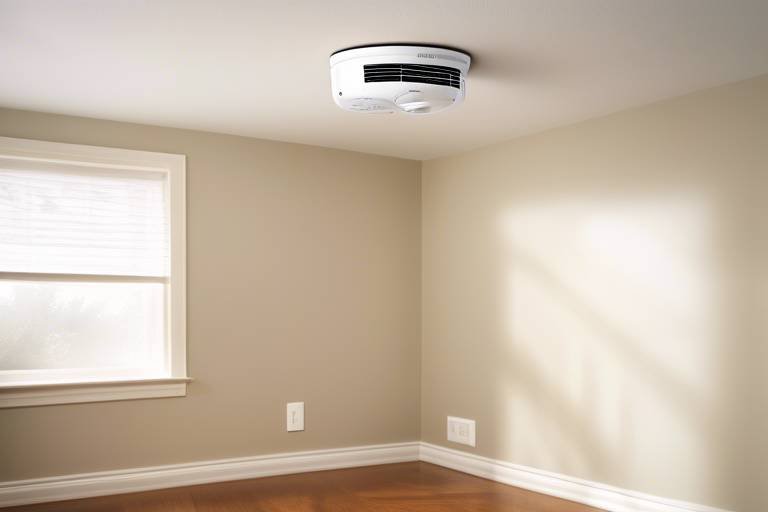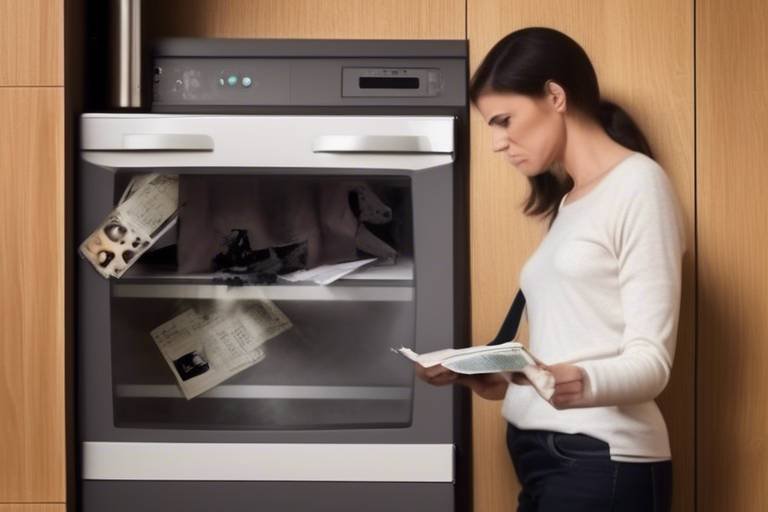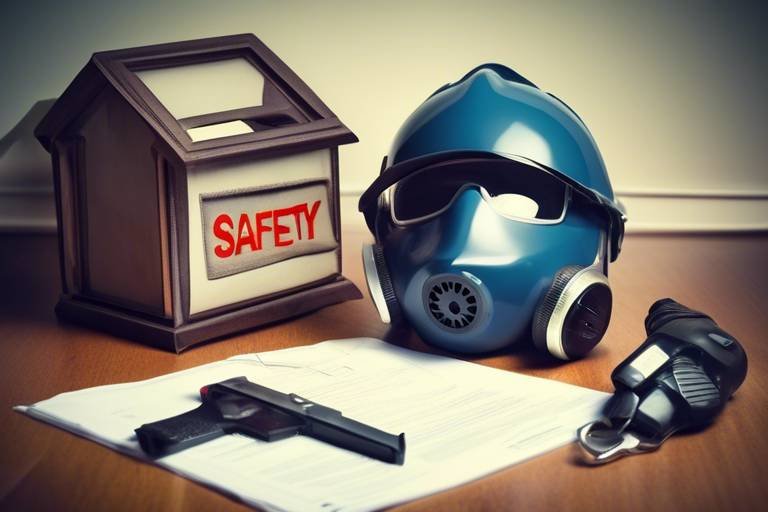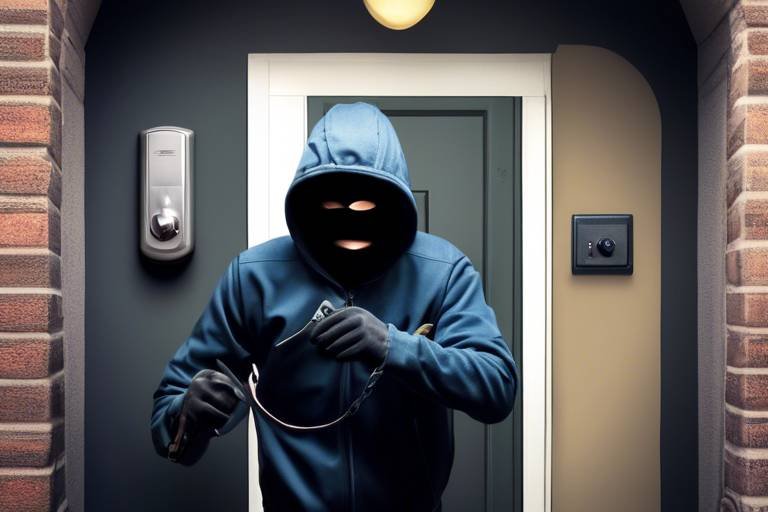How to Increase the Security of Your Apartment
In today's world, ensuring the safety of your living space is more critical than ever. Whether you live in a bustling city or a quiet suburb, the thought of a potential break-in can be unsettling. But fear not! This article provides practical tips and strategies to enhance the security of your apartment, ensuring peace of mind for residents through effective measures and proactive approaches. By taking the right steps, you can create a secure environment that not only protects your belongings but also fosters a sense of safety and community.
Understanding the vulnerabilities in your apartment's current security setup is the first step. Conducting a thorough assessment to identify weak points and areas that require improvement for enhanced safety is essential. Start by examining your doors and windows. Are they sturdy? Do they have reliable locks? What about your lighting? A well-lit exterior can deter intruders, so consider adding motion-sensor lights or brightening up dark corners. Additionally, think about your entry points. If you live on a lower floor, are there any accessible fire escapes or balconies that could be exploited? Taking the time to analyze these factors can provide a solid foundation for your security upgrades.
Investing in security systems, such as alarms and cameras, can significantly deter potential intruders. The mere presence of these devices can often be enough to make would-be burglars think twice. There are various options available, from basic alarm systems to sophisticated surveillance cameras that can be monitored remotely. Learning about these options and how they can be integrated into your apartment's security measures is crucial. For instance, a combination of door sensors and outdoor cameras can provide comprehensive coverage of your property.
Selecting an appropriate alarm system involves considering factors like monitoring options, installation methods, and features. Some systems offer 24/7 professional monitoring, while others allow for self-monitoring through smartphone apps. Think about what suits your lifestyle best. Do you want constant oversight, or are you comfortable checking in on your security yourself? Explore the types of alarm systems that best suit your apartment's needs, weighing the benefits of each option to find the perfect fit for your security strategy.
Deciding between DIY installation and hiring professionals can impact both cost and effectiveness. DIY systems can be more budget-friendly and allow for customization, but they may lack the reliability of professionally installed systems. On the other hand, professional installation ensures that everything is set up correctly and functioning optimally. Weigh the pros and cons of each method to determine the best approach for your situation. Consider your technical skills, your budget, and how much time you can dedicate to the installation process.
Smart home technology offers innovative solutions for apartment security. Discover how smart locks, cameras, and sensors can enhance safety and provide remote monitoring capabilities. With smart locks, you can control access to your apartment right from your smartphone. Imagine being able to let in a friend or service person while you’re at work, all without having to give out a physical key. Additionally, smart cameras can send alerts directly to your phone if they detect motion, allowing you to keep an eye on your home from anywhere. Embracing these technologies can significantly bolster your security measures.
Beyond technology, strengthening physical security measures is crucial. This section discusses practical steps to bolster the physical barriers of your apartment, ensuring a safer living environment. Start with your doors—invest in solid core doors and high-quality deadbolts. Don’t forget about your windows; consider adding window locks or security film to make them harder to break. Additionally, keeping your entryway clear of obstructions and maintaining good visibility can deter intruders. A little effort in enhancing physical security can go a long way in protecting your home.
Fostering a sense of community can enhance security. Building relationships with neighbors can lead to increased vigilance and support in monitoring each other's safety. When you know your neighbors, you're more likely to look out for one another. This camaraderie can create a network of eyes and ears, making it harder for intruders to go unnoticed. So, why not host a casual gathering or simply strike up a conversation next time you see them? It’s a small effort that can yield significant benefits.
Organizing a neighborhood watch program can significantly improve security. Explore the steps to establish a watch group and the benefits of collective vigilance in your apartment community. Start by gathering interested neighbors and discussing common concerns. Set regular meetings to share information and updates. Not only does a neighborhood watch create a safer environment, but it also fosters a sense of belonging and community spirit. Remember, safety is a shared responsibility, and when everyone pitches in, the whole neighborhood benefits.
Effective communication and trust among neighbors are vital for a successful security strategy. Discover ways to foster open dialogue and collaboration to enhance overall safety in your apartment complex. Consider creating a group chat or social media page where residents can share important information or alerts about suspicious activity. Trust is built over time, so be proactive in reaching out and building relationships. A friendly wave or a quick chat can go a long way in creating a supportive environment where everyone feels secure.
- What is the best way to secure my apartment? Start with a thorough assessment of your current security measures, then consider investing in a combination of alarm systems, smart technology, and physical security enhancements.
- Should I install security cameras? Yes! Security cameras can be a great deterrent against crime and provide valuable evidence if a break-in occurs.
- How can I get to know my neighbors better? Attend community events, start conversations in common areas, and consider organizing a neighborhood gathering to foster relationships.

Assessing Your Current Security
Understanding the vulnerabilities in your apartment's current security setup is the first step towards creating a safer living environment. Think of it like a detective uncovering clues at a crime scene; you need to analyze every nook and cranny to identify weak points. Start by examining the entry points of your apartment. Are the locks sturdy? Do they require a key or can they be easily manipulated? Make a checklist of all doors and windows, noting any that seem less secure.
Next, consider the lighting around your apartment. Poorly lit areas can be an open invitation for unwanted visitors. Are there dark corners outside your building? What about the hallways? Installing motion-sensor lights can go a long way in deterring potential intruders. Remember, visibility is key!
Another crucial aspect to assess is your surrounding environment. Take a walk around your building and observe the security measures in place. Are there surveillance cameras? Is there a security guard present? What about the overall condition of the building? A well-maintained property often signals that residents care about their safety. If the building looks neglected, it may attract trouble.
In addition to physical aspects, don’t forget to evaluate your personal habits. Do you leave your windows open when you’re not home? Are you careful about who you let into the building? Sometimes, the biggest security risks come from within. It might be worth considering a few behavioral changes to enhance your safety.
To summarize your assessment, you might want to create a simple table that outlines your findings:
| Security Aspect | Current Status | Recommendations |
|---|---|---|
| Entry Points | Weak locks on back door | Upgrade to deadbolt locks |
| Outdoor Lighting | Poor lighting in parking area | Install motion-sensor lights |
| Building Security | No surveillance cameras | Propose installation of cameras |
| Personal Habits | Leaving windows open | Close and lock windows when leaving |
After you've compiled your findings, prioritize them based on urgency and feasibility. This proactive approach not only gives you a clear picture of where you stand but also empowers you to take actionable steps towards enhancing your apartment's security. Remember, every little change can contribute to a more secure living space!

Installing Security Systems
When it comes to protecting your apartment, one of the most effective measures you can take is installing a security system. Not only does it act as a deterrent to potential intruders, but it also provides you with peace of mind knowing that your home is under constant surveillance. With a plethora of options available today, it’s essential to understand what fits your needs best. Whether you’re a tech enthusiast or someone who prefers a straightforward approach, there’s a security solution tailored just for you.
Start by considering the different types of security systems on the market. From traditional alarm systems to modern smart home integrations, the choices can be overwhelming. Here’s a brief overview of some popular options:
| Type of Security System | Description | Key Features |
|---|---|---|
| Monitored Alarm Systems | These systems alert a central monitoring station when triggered. | 24/7 monitoring, emergency response, and alerts via phone. |
| Unmonitored Alarm Systems | These systems sound an alarm but do not notify authorities. | Cost-effective, easy to install, and no monthly fees. |
| Smart Home Security | Integrates with your home network, allowing remote access and control. | Smart locks, cameras, and motion sensors that can be controlled via smartphone. |
Once you’ve narrowed down your options, the next step is to think about the installation method. You can either opt for a DIY approach or hire professionals. Each has its pros and cons:
- DIY Installation: This can save you money and allows for customization. However, it requires a degree of technical skill and understanding of the system.
- Professional Installation: While this may come with an additional cost, professionals can ensure that everything is set up correctly and functioning optimally, providing you with a hassle-free experience.
Regardless of the installation method you choose, ensure that your system covers all entry points in your apartment, including doors and windows. Additionally, consider incorporating motion sensors and surveillance cameras in common areas, as these can significantly enhance your security posture.
Finally, don’t overlook the importance of integrating your security system with other smart home devices. For instance, smart lights can be programmed to mimic your presence when you’re away, further deterring intruders. With the right combination of technology and strategy, you can create a comprehensive security solution that protects your apartment effectively.
In conclusion, investing in a security system is a crucial step in safeguarding your apartment. By assessing your needs, understanding the various options available, and choosing the right installation method, you can enhance your safety and enjoy peace of mind. Remember, the ultimate goal is to create a secure environment where you feel comfortable and at ease in your own home.
Q: How much does a security system cost?
A: The cost of a security system can vary widely depending on the type and features. Basic systems start around $200, while comprehensive smart home systems can exceed $1,000.
Q: Do I need a permit to install a security system?
A: It depends on your local laws. Some areas require permits for alarm systems, especially monitored ones. Always check with your local authorities.
Q: Can I install a security system myself?
A: Yes, many systems are designed for DIY installation. However, if you're unsure, hiring a professional can ensure proper setup.
Q: How often should I test my security system?
A: It's recommended to test your system at least once a month to ensure all components are functioning correctly.

Choosing the Right Alarm System
When it comes to securing your apartment, choosing the right alarm system can feel like navigating a maze. With so many options available, how do you know which one will suit your needs? The first step is to assess what you truly require. Are you looking for basic protection, or do you want a comprehensive system that integrates with your smart home devices? Understanding your priorities will help narrow down your choices.
One of the critical factors to consider is the monitoring options. Alarm systems typically come with two main types: self-monitored and professionally monitored. Self-monitored systems alert you via your smartphone, allowing you to take action when necessary. On the other hand, professionally monitored systems notify a monitoring center, which can dispatch emergency services if needed. If you travel frequently or are away from home often, a professionally monitored system might provide that extra peace of mind.
Next, think about the installation methods. Some systems require hardwiring, while others are wireless and can be set up in a matter of minutes. If you're renting, a wireless system might be more appealing since it won't damage your walls. However, if you're looking for something more permanent, a hardwired system could offer enhanced reliability. Don't forget to consider how the system will blend into your apartment's aesthetic. You don't want bulky equipment clashing with your decor!
Another aspect to evaluate is the features offered by various alarm systems. Here are some features you might want to look for:
- Smartphone Integration: The ability to control your alarm system remotely is a game-changer.
- Video Surveillance: Cameras can provide visual proof and act as a deterrent against intruders.
- Environmental Sensors: Some systems include smoke, carbon monoxide, and flood detection.
To make your decision easier, consider creating a comparison table to weigh the pros and cons of different alarm systems:
| Alarm System | Monitoring Type | Installation | Key Features |
|---|---|---|---|
| System A | Self-Monitored | Wireless | Smartphone alerts, video surveillance |
| System B | Professionally Monitored | Wired | Environmental sensors, remote access |
| System C | Self-Monitored | Wireless | Smart home integration, motion detection |
Ultimately, the right alarm system for your apartment will depend on your lifestyle, budget, and security needs. Take the time to research and compare options, and don’t hesitate to ask for recommendations from friends or online communities. Remember, investing in a quality alarm system is not just about protecting your belongings; it's about ensuring your peace of mind in your own home.

DIY vs. Professional Installation
When it comes to enhancing your apartment's security, one of the most critical decisions you'll face is whether to go the DIY route or hire a professional installer. Each option has its pros and cons, and understanding these can help you make an informed choice that best suits your needs and budget.
Choosing to install your security system yourself can be a rewarding experience. It allows you to save on installation costs and gives you complete control over the process. Plus, many modern security systems are designed with user-friendly interfaces that make installation straightforward. However, it’s essential to consider your own technical skills. If you're comfortable with tools and technology, you might find the DIY approach not only feasible but also enjoyable. You can take your time, ensuring that every component is set up exactly how you want it, and you can learn a lot in the process!
On the flip side, opting for professional installation can offer peace of mind. Professionals have the experience and expertise to ensure that your system is installed correctly and efficiently. They can identify optimal locations for cameras and sensors that you might overlook. Additionally, many installation services provide a warranty for their work, which can be a significant advantage if something goes wrong later. However, this convenience comes at a cost, often making professional installation a more expensive option.
To help you weigh your options, here’s a quick comparison:
| Criteria | DIY Installation | Professional Installation |
|---|---|---|
| Cost | Generally lower, only equipment costs | Higher, includes labor and expertise fees |
| Time | May take longer depending on your skill level | Typically quicker, as professionals are experienced |
| Expertise | Requires some technical knowledge | Expert installation with industry knowledge |
| Customization | Highly customizable to your preferences | May offer limited customization based on service |
| Support | Self-support, may require troubleshooting | Professional support and warranty often included |
Ultimately, the decision between DIY and professional installation boils down to your comfort level with technology, your budget, and how much time you can dedicate to the project. If you choose to go the DIY route, make sure to follow all instructions carefully and consider watching tutorial videos for guidance. On the other hand, if you opt for professional help, do your homework to find a reputable service provider with good reviews.
- What are the costs associated with DIY security system installation?
The costs primarily include the security equipment itself. You may also want to factor in additional tools or materials if needed.
- How do I choose a professional installer?
Look for reviews and recommendations, check their credentials, and ask for quotes from multiple providers to ensure you're getting the best service.
- Can I mix DIY and professional installation?
Absolutely! Many homeowners choose to install basic components themselves and hire professionals for more complex systems.

Smart Home Security Options
In today's fast-paced world, smart home security options have revolutionized the way we protect our living spaces, especially in apartments where space and privacy can be limited. Imagine being able to monitor your home from anywhere in the world, all from the palm of your hand. With the rise of IoT (Internet of Things), smart security devices are not just a luxury; they are becoming essential for anyone looking to enhance their apartment's safety.
One of the most appealing aspects of smart security is the integration of various devices that work together seamlessly. For instance, smart locks can be paired with security cameras and motion sensors to create a comprehensive security network. This means you can lock your door remotely, receive alerts if someone is at your door, and even see who it is through your smartphone. It's like having a digital fortress at your fingertips!
When considering smart home security, you might wonder about the types of devices available. Here are some popular options:
- Smart Locks: These allow you to lock and unlock your doors remotely. Some even offer keyless entry through mobile apps or biometric recognition.
- Security Cameras: Indoor and outdoor cameras provide real-time surveillance and can send alerts directly to your phone if they detect motion.
- Motion Sensors: These devices can detect movement in and around your apartment, alerting you to any unusual activity.
- Video Doorbells: A smart doorbell with a camera lets you see and speak to visitors without opening the door, adding an extra layer of security.
Setting up these devices is often user-friendly, with many products designed for easy DIY installation. However, if you're not tech-savvy, don't worry! Many companies offer professional installation services, ensuring that your system is set up correctly and efficiently. The investment in smart security can vary, but it's essential to consider the long-term benefits of enhanced safety and peace of mind.
Moreover, many smart home security systems integrate with your existing home automation setups, allowing you to control lights, thermostats, and other devices from the same app. This not only enhances your security but also adds convenience to your daily life. Imagine coming home to a well-lit apartment with the temperature just right, all thanks to your smart home system.
In conclusion, embracing smart home security options is a proactive step towards safeguarding your apartment. With a range of devices available, you can customize a security solution that fits your lifestyle and needs. The peace of mind that comes with knowing your home is secure, even when you're away, is truly invaluable.
Q: Are smart security systems easy to install?
A: Most smart security systems are designed for easy DIY installation, but professional installation is also available for those who prefer it.
Q: Can I monitor my smart security system remotely?
A: Yes! Most smart security devices allow you to monitor your apartment from anywhere through a mobile app.
Q: Do smart locks require a special key?
A: Smart locks often use keyless entry methods, such as codes or smartphone apps, eliminating the need for traditional keys.
Q: Are smart security systems compatible with other smart home devices?
A: Many smart security systems can integrate with other smart home devices, allowing you to control everything from one app.

Enhancing Physical Security
When it comes to securing your apartment, technology is just one piece of the puzzle. Physical security plays a pivotal role in creating a safe living environment. Start by evaluating the entry points of your apartment. Are your doors solid and well-fitted? Do you have deadbolts installed? These are critical factors that can make or break your security. Consider reinforcing your doors with a door jamb reinforcement kit, which can prevent forced entry. Additionally, ensure that your windows are secure. Installing window locks or using security film can make it significantly harder for intruders to gain access.
Another essential aspect of physical security is lighting. A well-lit apartment complex can deter potential intruders who prefer to operate under the cover of darkness. Consider installing motion-sensor lights around your entrance and balcony. These lights not only illuminate your space but also alert you to any movement outside. Furthermore, if your apartment has a balcony or patio, ensure that these areas are secured. Use trellises or fencing to create a physical barrier, and always keep valuables out of sight.
Moreover, think about the landscaping around your apartment. Overgrown bushes or trees can provide hiding spots for unwanted visitors. Keep your shrubs trimmed and consider using plants with thorns near windows or entry points. This natural barrier can be an effective deterrent. If you live on a lower floor, it’s wise to install window screens or grilles that can be locked, adding another layer of security.
Lastly, don't underestimate the power of neighborhood awareness. Building relationships with your neighbors can significantly enhance your apartment's security. When everyone is vigilant, it creates a community that looks out for one another. Consider organizing a small gathering to discuss safety concerns and share tips. A united front can make it much harder for intruders to feel comfortable in your area.
In summary, enhancing physical security in your apartment involves a combination of strong locks, proper lighting, secure landscaping, and community engagement. By taking these steps, you can create a safer space for yourself and your neighbors.
- What are the best types of locks for apartment doors?
Deadbolts are highly recommended for apartment doors as they provide a strong layer of security. Consider using smart locks for added convenience. - How can I make my windows more secure?
Install window locks, use security film, and consider adding window sensors that alert you to any unauthorized entry. - Is it worth investing in a security system?
Absolutely! A good security system can deter intruders and provide peace of mind. Look for systems that offer 24/7 monitoring. - How can I build relationships with my neighbors?
Start by introducing yourself and engaging in friendly conversations. Consider organizing community events or safety meetings to foster connections.

Building Relationships with Neighbors
When it comes to enhancing the security of your apartment, one of the most underrated strategies is simply getting to know your neighbors. Imagine living in a community where everyone looks out for one another, like a tight-knit family. Building relationships with your neighbors not only fosters a sense of community but also creates a network of vigilance that can significantly enhance your safety. After all, who better to notice suspicious activity than those who live right next door?
Start by introducing yourself to your neighbors. A friendly smile and a simple "hello" can go a long way. Consider hosting a small gathering, like a coffee morning or a weekend barbecue, where you can invite your neighbors over. This informal setting allows everyone to mingle, share stories, and establish trust. The more familiar you are with each other, the more likely you are to notice when something feels off. It’s like creating a safety net; when one person spots something unusual, they can alert the others, and together, you can act.
Additionally, communication is key. Establish a group chat or a social media group dedicated to your apartment community. This can be a platform to share important updates, safety tips, or even just to check in on each other. In a world where technology connects us, why not use it to enhance our safety? You might also consider setting up a neighborhood watch program, which can be an effective way to formalize your efforts. By organizing regular meetings to discuss safety concerns and strategies, you can create a proactive community that is always prepared.
Furthermore, trust is essential. If you see a neighbor struggling with groceries or a package, lend a helping hand. These small acts of kindness can build a strong foundation of trust and goodwill. When neighbors feel comfortable with each other, they are more likely to communicate openly about any concerns or incidents that might arise. This creates a culture of vigilance where everyone is invested in the safety of the community.
In conclusion, building relationships with your neighbors is not just a feel-good endeavor; it’s a practical approach to enhancing your apartment security. By fostering a sense of community, you can create a network of support that benefits everyone. So, take that first step—smile, wave, and introduce yourself. You never know how much of a difference it can make in your life and the lives of those around you.
Q: How can I start building relationships with my neighbors?
A: Start by introducing yourself and engaging in small talk. Consider hosting a casual gathering to encourage interaction.
Q: What are some effective ways to communicate with neighbors?
A: You can create a group chat or a social media group for your apartment community to share updates and safety tips.
Q: How can a neighborhood watch program help with security?
A: A neighborhood watch program encourages collective vigilance, allowing residents to report suspicious activities and support each other in maintaining safety.
Q: What if my neighbors are unfriendly or unapproachable?
A: It can be challenging, but try to be persistent. Sometimes, a simple gesture like offering help can break the ice and lead to a better relationship.

Creating a Neighborhood Watch
Establishing a Neighborhood Watch program can be one of the most effective ways to enhance security in your apartment complex. Think of it as forming a safety net where everyone looks out for each other. The idea is simple: when neighbors become more aware of their surroundings and actively communicate about suspicious activities, the overall safety of the community improves. But how do you get started? Let's break it down!
First, gather a group of interested residents. This can be as simple as chatting with your neighbors during a casual encounter or organizing a small meeting in your building's common area. The goal is to create a group of committed individuals who share the same vision of a safer community. Once you have a core group, it's essential to establish some ground rules and objectives for your Neighborhood Watch. This might include:
- Regularly scheduled meetings to discuss any concerns or updates.
- Creating a communication channel (like a group chat or email list) to report suspicious activities quickly.
- Organizing social events to strengthen relationships among residents.
Next, consider the logistics of your watch program. It's beneficial to designate a leader or a few point people who can coordinate activities and serve as the main contact for residents. This person will be responsible for organizing meetings, collecting feedback, and ensuring that everyone is informed about the latest developments. You might even want to create a simple contact list that includes names, apartment numbers, and phone numbers of participants, making it easier to reach out when necessary.
Another crucial aspect of a Neighborhood Watch is establishing a relationship with local law enforcement. Invite a police officer to one of your meetings to discuss crime trends in your area and learn about effective crime prevention strategies. They can provide valuable insight and may even offer to conduct safety workshops for residents. This collaboration not only strengthens your watch program but also fosters trust between the community and law enforcement.
As your Neighborhood Watch gains traction, consider organizing community events that promote safety and awareness. For example, you could host a Safety Day where residents can learn about self-defense, home security tips, and emergency preparedness. These events not only educate but also create a sense of camaraderie among neighbors, making it easier for everyone to work together in monitoring the area.
Lastly, remember that the success of a Neighborhood Watch hinges on communication and trust. Encourage open dialogue among residents and create an environment where everyone feels comfortable sharing their concerns. Regular updates about the program's progress and any incidents can help maintain engagement and foster a sense of community responsibility.
In conclusion, creating a Neighborhood Watch is about empowering residents to take an active role in their safety. By fostering relationships, communicating effectively, and working together, you can significantly reduce crime and create a more secure living environment for everyone. So, gather your neighbors, start the conversation, and take the first step towards a safer community!
Q: How do I start a Neighborhood Watch program?
A: Begin by gathering interested neighbors and discussing the idea. Set clear objectives and establish communication channels to share information.
Q: What should I discuss in Neighborhood Watch meetings?
A: Focus on community safety concerns, recent incidents, crime trends, and ways to improve security measures in your area.
Q: Can I involve local law enforcement?
A: Absolutely! Invite police officers to your meetings for expert advice and to strengthen the relationship between your community and law enforcement.
Q: What if my neighbors are not interested in participating?
A: Start small and engage those who are interested. Over time, as you demonstrate the benefits of the program, others may become more inclined to join.

Communication and Trust
Effective communication and trust among neighbors are the cornerstones of a successful security strategy in any apartment complex. Imagine living in a community where everyone looks out for one another; it’s like having a safety net woven from the threads of mutual respect and understanding. When neighbors are willing to share information about suspicious activities or concerns, it creates a supportive environment that can significantly reduce the risk of crime. But how do we foster this vital communication?
First and foremost, it's essential to establish open lines of communication. This could be as simple as starting a group chat on a messaging app or creating a community bulletin board in your building. Regularly sharing updates, whether they are about safety tips or local events, helps maintain a connection among residents. For instance, you might consider organizing monthly meetings where residents can discuss safety issues, share experiences, and brainstorm solutions together. These gatherings don't have to be formal; they can also be casual coffee meet-ups where everyone feels comfortable expressing their thoughts.
Moreover, trust is built when residents feel heard and respected. Listening to each other’s concerns and acting upon them can create a sense of belonging and responsibility. When a neighbor reports a suspicious activity, for instance, it’s crucial for others to take it seriously rather than dismiss it. This collective vigilance can act as a deterrent to potential intruders, as they sense that the community is alert and engaged. It's like having a watchful eye at every corner of your building, ensuring that everyone is safe.
Additionally, consider forming small groups within your apartment community that focus on specific areas of concern, such as security, maintenance, or social activities. This division of responsibilities not only helps in managing tasks effectively but also encourages residents to collaborate and communicate more frequently. When people work together, they naturally build trust and camaraderie, which are essential for a secure living environment.
In conclusion, fostering communication and trust among neighbors is not just about sharing information; it's about building a community where everyone feels empowered and responsible for each other's safety. By creating a culture of openness, respect, and collaboration, you transform your apartment complex into a warm, inviting, and secure haven for all residents.
| Question | Answer |
|---|---|
| How can I start a neighborhood watch program? | Begin by gathering interested neighbors and discussing safety concerns. Set up regular meetings and establish a communication system to share information. |
| What are some effective ways to communicate with neighbors? | Consider using group messaging apps, community bulletin boards, or social media groups to keep everyone informed and connected. |
| How do I build trust with my neighbors? | Be open, listen actively to their concerns, and show that you care about their safety. Participate in community activities to strengthen relationships. |
Frequently Asked Questions
- What are the first steps to assess my apartment's security?
Start by conducting a thorough walkthrough of your apartment. Look for potential vulnerabilities like unlocked windows, poor lighting in entryways, or weak door locks. Make a list of these weak points to address them effectively.
- Are security systems really worth the investment?
Absolutely! Investing in security systems like alarms and cameras can significantly deter potential intruders. They not only enhance your safety but also provide peace of mind, knowing that you’re taking proactive steps to protect your home.
- How do I choose the right alarm system for my apartment?
When selecting an alarm system, consider factors such as your budget, the size of your apartment, and the features you need. Look for systems with monitoring options, easy installation, and the ability to integrate with other smart home devices.
- Should I install the security system myself or hire a professional?
This depends on your comfort level with technology. DIY installation can save you money, but hiring a professional ensures that the system is set up correctly and functions optimally. Weigh the pros and cons based on your situation.
- What are some effective physical security measures I can implement?
Consider reinforcing door and window locks, installing deadbolts, and using security bars. Also, ensure your entry points are well-lit and free from obstructions that could provide cover for intruders.
- How can building relationships with neighbors improve security?
When neighbors know each other, they are more likely to look out for one another. A close-knit community can share information about suspicious activities, making everyone feel more secure and supported.
- What is a neighborhood watch, and how can I start one?
A neighborhood watch is a community program where residents work together to monitor and report suspicious activities. To start one, gather interested neighbors, schedule meetings to discuss safety concerns, and establish a communication plan for sharing information.
- How can I ensure effective communication among neighbors?
Establishing a group chat or a social media page can facilitate quick communication. Regular meetings to discuss safety and security can also foster trust and collaboration among residents, enhancing overall community safety.

